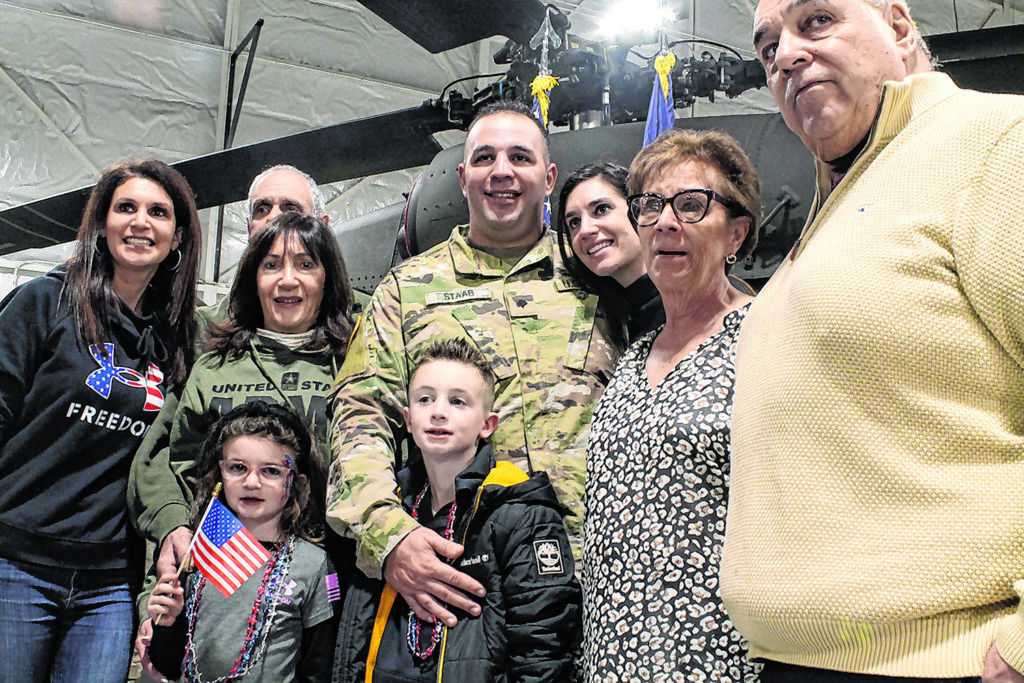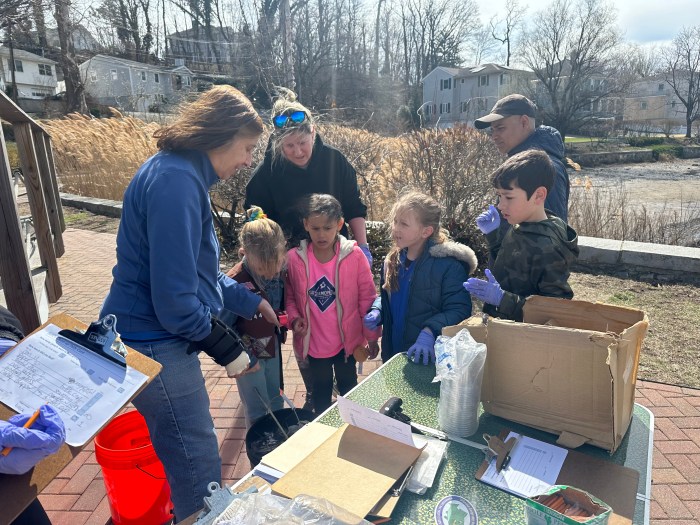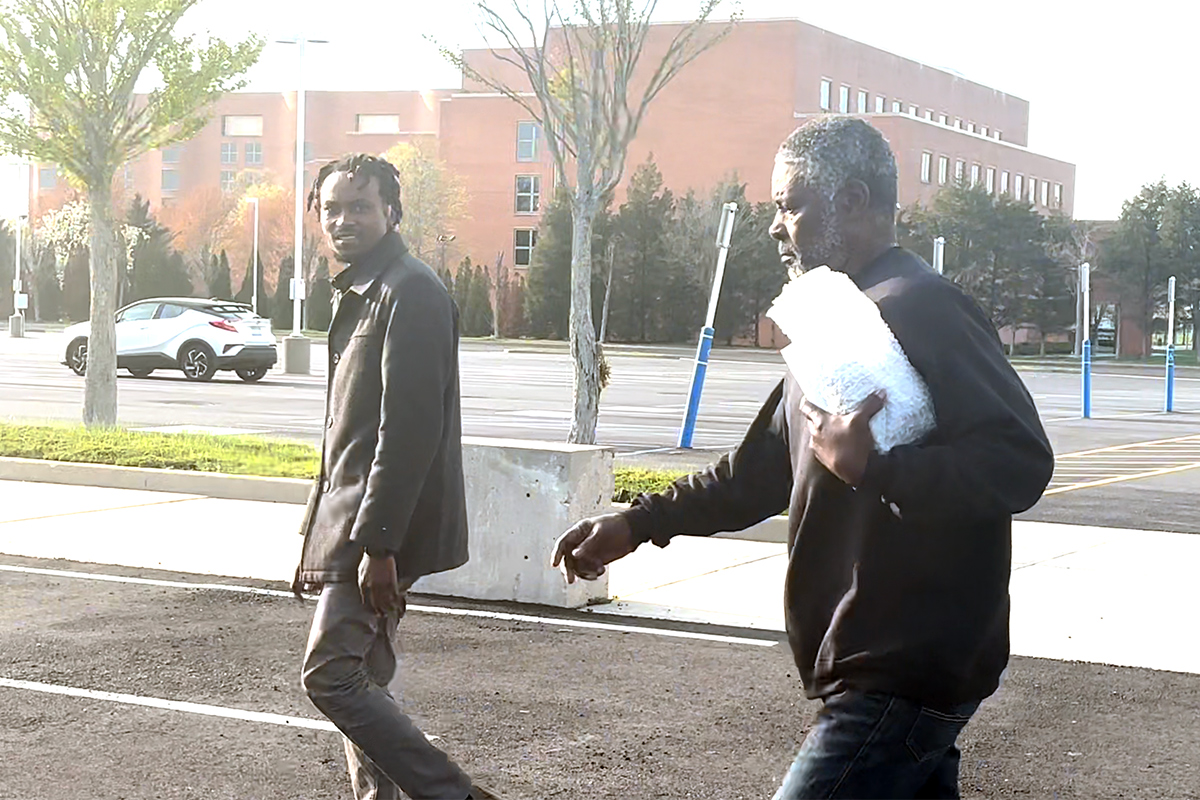Long Island National Guard Soldiers recognized on
Sunday, Jan. 22 prior to Middle East deployment
With a great deal of solemnity, ceremony and pomp, 150 soldiers from the New York Army National Guard 642nd Aviation Support Battalion, their families and loved ones celebrated one last time on January 22 before the unit was sent overseas. They will be supporting Task Force Spartan, the 10,000-Soldier Army presence in the Middle East.
The National Guard has a dual mission, both providing trained units to the states, territories and the District of Columbia, and keeping itself equipped to protect life and property and providing trained units to the nation that are equipped and ready to defend the United States and its interests all over the globe.
The 642nd Aviation Support Battalion deployed to Kuwait in 2013 and 2014 as part of the 42nd Combat Aviation Brigade, conducting support operations across the Middle East. In 2005, the battalion, then known as the 642nd Divisional Aviation Support Battalion, deployed to Tikrit, Iraq as part of the 42nd Combat Aviation Brigade and the 42nd Infantry Division. During that deployment, the battalion conducted 180 combat logistics patrols covering nearly 60,000 miles, while repelling multiple attacks by insurgent forces. The unit also recovered three downed aircraft. During the deployment two purple hearts were awarded and six vehicles were lost to enemy fire, but no soldiers were killed.
The company deployed to Afghanistan, where the heavy lift and high-altitude capabilities of the CH-47 helicopter, the largest in the Army’s inventory, were vital. The unit served in Afghanistan from 2007 to 2008, again in 2012 and 2013, and in 2018.
Here in New York, soldiers of the battalion responded to the Sept. 11, 2001, attacks on the World Trade Center in New York City, and supported operations in the aftermath of Superstorm Sandy in 2012. Soldiers from the company participated in state responses to Superstorm Sandy in 2012, and the “Snowvember” Storm in 2014. This fall the unit deployed an aircraft and crew to Florida to assist in the response to Hurricane Ian.
This time, The 642nd will conduct two weeks of training at Fort Indiantown Gap, a training base near Harrisburg, Pennsylvania, and then deploy to Fort Hood, Texas, for about two more months of training before deploying to Kuwait. The 642nd Aviation has elements located in Rochester and Dunkirk in western New York, and in Farmingdale and Ronkonkoma on Long Island. The battalion is part of the New York Army National Guard’s 42nd Expeditionary Combat Aviation Brigade.
The Nassau County Police Emerald Society Pipes and Drums honored the departing soldiers with a number of songs. Both the Adjutant General for the State of New York Major General Ray Shields and New York Army National Guard Brigadier General Jack A. James gave speeches encouraging the soldiers to rely on each other, to stand for what is right, and to strive for greatness. Some soldiers were nervous and some were eager. All expressed their desire to serve. Parents hugged their children and couples stood together.
One of those couples was Stephanie and Army Specialist Alfred Staab. The Staabs found out that Al was being deployed about a month before their wedding last spring. They spent the next few months buying a house, exploring the outdoors, and spending time with family and friends. Stephanie Staab, the psychologist at Manhasset Secondary School, was also the Family Readiness Group Leader for this unit.
“Al had asked me to if I wanted to be the Family Readiness Group Leader. When he first described it to me, he said ‘if anything were to happen to one of the soldiers you would consult with families, you would help them go through that process.’ And being a school psychologist, I said, ‘Sure, I will 100% take on that responsibility.’ But then I learned more, and it kind of has a bigger role than I was expecting.” Staab said.
This role turned out to be the perfect distraction from the impending deployment. As the FRG leader, Staab is the liaison between the families and the commander. “If the families need anything from their soldiers, and for some reason, they can’t get in contact with them, I can get in touch with the commander. He’ll get in touch with the soldier and then it’ll go back down the chain. If the soldiers need anything, like let’s say they need more socks or you know, a bunch of them need, you know, some type of supplies or something. The commander would let me know and then I would kind of coordinate with all the families.”
Part of her duties in this role was organizing the deployment ceremony, but she also organizes monthly meetings. Some meetings are a check-in where Staab lets the families know about resources and updates, and some are planning sessions for events like the Christmas party and the deployment ceremony. They also work with other organizations like the Blue Star Moms to combine efforts and send the soldiers care packages. This is one facet of her strategy to cope with this separation: staying busy.
She also has a strong support network, something she intends to lean into as time goes by. “My parents live in Bethpage. They live 20 minutes from me (in Huntington) and my sister lives a couple blocks from me. Al’s parents live in Bayville. So that’s like 20 minutes away. I have a ton of friends, work friends, friends from high school. There were four of us wives that were talking the whole time and our husbands are close. So right after (the men left) we started a group chat and we’ve been talking every day. We joke around about things and it’s a nice support system. We’re all going through it together.”
As an expert in mental health, her advice for others in a similar situation is to be physically active, “whether that be like yoga, going for daily walks going to the gym like getting out and doing some type of physical activity is very beneficial. Number one, not just for your mental health, but for your body and your overall health. I always encourage people to get out and do some type of physical activity.“
Another thing she recommends for people who are separated from their loved ones is communication. It’s incredibly easy to reach out with today’s technology, but Staab said making these connections routine and intentional provides a kind of security that wards off anxiety. “We’ve established a routine, we always say good morning to each other. We always make sure we say good night, he always calls me before bed, and then he’ll update me at some point during the day. We can’t constantly be checking our phone and waiting for a text message because that just builds up anxiety. So I think establishing what times can we talk and when to expect a call to expect a text message (helps).”
Taking the time to write things down can also help people process feelings in a healthy way. “Because sometimes it is hard to tell people, even your family, who aren’t going through it. Of course you want to tell them what’s going on, but they can’t really relate. So if you don’t have military wives or something like that, who understand it, just getting your thoughts down on paper. It’s a really therapeutic way of dealing with your emotions.“
Currently, 1,800 New York Army National Guard Soldiers are deployed overseas.
—With additional reporting by the New York State Division of Military and Naval Affairs
Half A World Away: 642nd Aviation Support Battalion Prepares To Serve

































